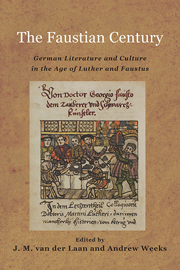Book contents
- Frontmatter
- Contents
- List of Illustrations
- Acknowledgments
- Introduction: Faust Scholarship and the Project at Hand
- 1 The German Faustian Century
- 2 Faustus of the Sixteenth Century: His Life, Legend, and Myth
- 3 Cornelius Agrippa's Double Presence in the Faustian Century
- 4 Converging Magical Legends: Faustus, Paracelsus, and Trithemius
- 5 Faust from Cipher to Sign and Pious to Profane
- 6 The Aesthetics of the 1587 Spies Historia von D. Johann Fausten
- 7 The Lutheran Faust: Repentance in the Augsburg Confession and the German Faustbuch
- 8 Marriage in the Historia von D. Johann Fausten (1587)
- 9 Antiauthoritarianism and the Problem of Knowledge in the Faustbuch
- 10 Exploring the “Three-Fold World”: Faust as Alchemist, Astrologer, and Magician
- 11 The Devil in the Early Modern World and in Sixteenth-Century German Devil Literature
- 12 Encounters with “Schwarz-Hans”: Jacob Böhme and the Literature of the Devil in the Sixteenth Century
- 13 D. Johann Faust and the Cannibals: Geographic Horizons in the Sixteenth Century
- A Sixteenth-Century Chronology of Significant References to Faust with Parallel World Events
- Select Bibliography
- Notes on the Contributors
- Index
Introduction: Faust Scholarship and the Project at Hand
Published online by Cambridge University Press: 05 May 2013
- Frontmatter
- Contents
- List of Illustrations
- Acknowledgments
- Introduction: Faust Scholarship and the Project at Hand
- 1 The German Faustian Century
- 2 Faustus of the Sixteenth Century: His Life, Legend, and Myth
- 3 Cornelius Agrippa's Double Presence in the Faustian Century
- 4 Converging Magical Legends: Faustus, Paracelsus, and Trithemius
- 5 Faust from Cipher to Sign and Pious to Profane
- 6 The Aesthetics of the 1587 Spies Historia von D. Johann Fausten
- 7 The Lutheran Faust: Repentance in the Augsburg Confession and the German Faustbuch
- 8 Marriage in the Historia von D. Johann Fausten (1587)
- 9 Antiauthoritarianism and the Problem of Knowledge in the Faustbuch
- 10 Exploring the “Three-Fold World”: Faust as Alchemist, Astrologer, and Magician
- 11 The Devil in the Early Modern World and in Sixteenth-Century German Devil Literature
- 12 Encounters with “Schwarz-Hans”: Jacob Böhme and the Literature of the Devil in the Sixteenth Century
- 13 D. Johann Faust and the Cannibals: Geographic Horizons in the Sixteenth Century
- A Sixteenth-Century Chronology of Significant References to Faust with Parallel World Events
- Select Bibliography
- Notes on the Contributors
- Index
Summary
This volume investigates and illumines the German sixteenth century—the age of the Renaissance, Reformation, and Faust. Bringing old and new research together, this book structures its study of that era around the figure of Faust. The stories about him address a number of definitive issues for his century, in particular, the intersection of Renaissance humanism and Reformation theology, the practice of magic and diabolism, the interplay of fact and fantasy, the juxtaposition of good and evil (or of the spirit and the world), and the submission to or transgression of the moral code. What is more, Faust forms a focal point around which other related figures in one way or another revolve, figures such as Agrippa von Nettesheim, Theophrastus Bombastus von Hohenheim (better known as Paracelsus), Johannes Trithemius, Martin Luther, Philipp Melanchthon, Andreas Osiander, Leonhardt Thurneisser zum Thurn, or Christopher Marlowe. The attention this collection gives especially to the book Johann Spies published in 1587 affords glimpses of sixteenth-century life, society, and attitudes—in a word, its zeitgeist.
By now, Faust has a long tradition and pedigree. Previous scholarship has generated a wealth of material about him as a historical, legendary, and literary figure. Work on the German Faust tradition received early impulses from Johann Georg Neumann (Disquisitio historica de Fausto praestigiatore, 1693) and Christian Heinrich Weiss (Dissertativncula brevi de Doctor, quem vocant, Jo. Favsto, 1728). It continued with Georg Conrad Horst, who, starting in 1821, published his voluminous Zauber-Bibliothek oder von Zauberei, Theurgie und Mantik, Zauberern, Hexen und Hexenprozessen, Dämonen, Gespenstern, und Geistererscheinungen and with J. Scheible, whose multivolume Das Kloster.
- Type
- Chapter
- Information
- The Faustian CenturyGerman Literature and Culture in the Age of Luther and Faustus, pp. 1 - 16Publisher: Boydell & BrewerPrint publication year: 2013



